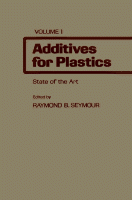Browse content
Table of contents
Actions for selected chapters
- Full text access
- Book chapterNo access
NONREINFORCING FILLERS FOR PLASTICS
Raymond B. Seymour
Pages 1-7 - Book chapterNo access
NATURAL AND SYNTHETIC SILICAS IN PLASTICS
M.P. Wagner
Pages 9-28 - Book chapterNo access
REINFORCEMENT OF POLYMERS THROUGH SHORT CELLULOSE FIBERS
P. Hamed and A.Y. Coran
Pages 29-50 - Book chapterNo access
ASBESTIFORM FILLERS
J.H. Kietzman
Pages 51-77 - Book chapterNo access
WHISKERS AND MICROFIBERS
John V. Milewski
Pages 79-122 - Book chapterNo access
SILANE COUPLING AGENTS
Edwin P. Plueddemann
Pages 123-167 - Book chapterNo access
NONSILANE COUPLING AGENTS
Salvatore J. Monte and Gerald Sugerman
Pages 169-191 - Book chapterNo access
NONFILLER ADDITIVES FOR PLASTICS
Raymond B. Seymour
Pages 193-201 - Book chapterNo access
PLASTICIZERS
Rudolph D. Deanin
Pages 203-217 - Book chapterNo access
BIOCIDES
Eugene L. Cadmus
Pages 219-231 - Book chapterNo access
OPTICAL AND OTHER EFFECTS OF WHITE PIGMENTS IN PLASTICS
W.S. Castor and J.A. Manasso
Pages 233-248 - Book chapterNo access
HEAT STABILIZERS
Elliot L. Weinberg
Pages 249-258 - Book chapterNo access
FLAME RETARDANT ADDITIVES FOR PLASTICS
R.P. Levek
Pages 259-275 - Book chapterNo access
INDEX
Pages 277-279
About the book
Description
Additives for Plastics: Volume 1, State of the Art summarizes the state of the art about additives for plastics, including coupling agents for fillers and plasticizers, as well as colorants, silicas, cellulose fiber, whiskers, and microfibers. Stabilizers for weather, fungal, and heat resistance and resistance to ultraviolet radiation are also considered. This volume is comprised of 13 chapters; the first of which introduces the reader to nonreinforcing fillers such as carbon black, wood flour, alpha cellulose, calcium carbonate, and natural and synthetic silicates. The discussion then turns to synthetic and naturally occurring silicas, short cellulose fibers for reinforcing polymers, and asbestiform fillers. Whiskers and microfibers are the subject of the subsequent chapter, with emphasis on their differences and similarities, application in various plastics, and prospects. Silane and nonsilane coupling agents, nonfiller additives, plasticizers, biocides, and heat stabilizers are also examined. This volume also evaluates rutile titanium dioxide and other white pigments with regard to the opacification and coloring of plastics. This book will be of vital interest to those who are closely associated with the plastics industry as well as those who are concerned with the design, fabrication, and use of plastics.
Additives for Plastics: Volume 1, State of the Art summarizes the state of the art about additives for plastics, including coupling agents for fillers and plasticizers, as well as colorants, silicas, cellulose fiber, whiskers, and microfibers. Stabilizers for weather, fungal, and heat resistance and resistance to ultraviolet radiation are also considered. This volume is comprised of 13 chapters; the first of which introduces the reader to nonreinforcing fillers such as carbon black, wood flour, alpha cellulose, calcium carbonate, and natural and synthetic silicates. The discussion then turns to synthetic and naturally occurring silicas, short cellulose fibers for reinforcing polymers, and asbestiform fillers. Whiskers and microfibers are the subject of the subsequent chapter, with emphasis on their differences and similarities, application in various plastics, and prospects. Silane and nonsilane coupling agents, nonfiller additives, plasticizers, biocides, and heat stabilizers are also examined. This volume also evaluates rutile titanium dioxide and other white pigments with regard to the opacification and coloring of plastics. This book will be of vital interest to those who are closely associated with the plastics industry as well as those who are concerned with the design, fabrication, and use of plastics.
Details
ISBN
978-0-12-637501-5
Language
English
Published
1978
Copyright
Copyright © 1978 Elsevier Inc. All rights reserved.
Imprint
Academic Press
